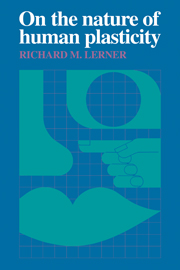Book contents
- Frontmatter
- Contents
- Foreword by Paul Baltes
- Preface
- 1 Perspectives on plasticity
- 2 The life-span view of human development: philosophical, historical, and substantive bases
- 3 Gene marking, recombinant DNA technology, and gene transfer: toward true gene therapy
- 4 Neuroanatomical bases of human plasticity
- 5 Human neurochemistry and the role of neurotransmitters
- 6 Evolutionary biology and hominid evolution
- 7 Comparative-developmental psychological bases of plasticity
- 8 Individual and group interdependencies
- 9 Toward future multidisciplinary efforts
- 10 Conclusions: On the limits of plasticity and the plasticity of limits
- References
- Author index
- Subject index
1 - Perspectives on plasticity
Published online by Cambridge University Press: 22 March 2010
- Frontmatter
- Contents
- Foreword by Paul Baltes
- Preface
- 1 Perspectives on plasticity
- 2 The life-span view of human development: philosophical, historical, and substantive bases
- 3 Gene marking, recombinant DNA technology, and gene transfer: toward true gene therapy
- 4 Neuroanatomical bases of human plasticity
- 5 Human neurochemistry and the role of neurotransmitters
- 6 Evolutionary biology and hominid evolution
- 7 Comparative-developmental psychological bases of plasticity
- 8 Individual and group interdependencies
- 9 Toward future multidisciplinary efforts
- 10 Conclusions: On the limits of plasticity and the plasticity of limits
- References
- Author index
- Subject index
Summary
In recent years, many social scientists (e.g., Baltes, Reese, & Lipsitt, 1980; Clarke & Clarke, 1976; Brim & Kagan, 1980) have been seriously questioning long-held conceptions of human development stressing constancy or continuity across life (e.g., see Fraiberg, 1977; Klaus & Kennell, 1976). The alternative view that has been emerging, based on increasing research evidence at levels of analysis ranging from the genetic to the cultural, stresses instead human plasticity at multiple levels of being (e.g., Cotman & Nieto-Sampedro, 1982; Greenough & Green, 1981; McClearn, 1981). Indeed, both theoretical and empirical work increasingly support the conviction that processes at any one of these levels of analysis may be linked to processes at every other level (e.g., Brent, 1978a; Magnusson, 1981; Magnusson & Allen, 1983; Prigogine, 1978, 1980).
Such developments call for a multidisciplinary reappraisal of the nature and bases of plasticity in human functioning and development and hold out the promise that multilevel multidisciplinary research and intervention will further increase behavioral plasticity and enhance human development. This revised view of the science of human behavior, which stresses complex interrelationships among the levels of human functioning – the inner biological, individual psychological, group and social network, societal, cultural/historical, and so on (Bronfenbrenner, 1977, 1979; Sarbin, 1977) – offers a perspective on causality that differs from past conceptions (Overton & Reese, 1981) and once again underscores the need for scientists to attend to the role that personal values and beliefs play in their research and intervention efforts (cf. Toulmin, 1981).
- Type
- Chapter
- Information
- On the Nature of Human Plasticity , pp. 1 - 21Publisher: Cambridge University PressPrint publication year: 1984



